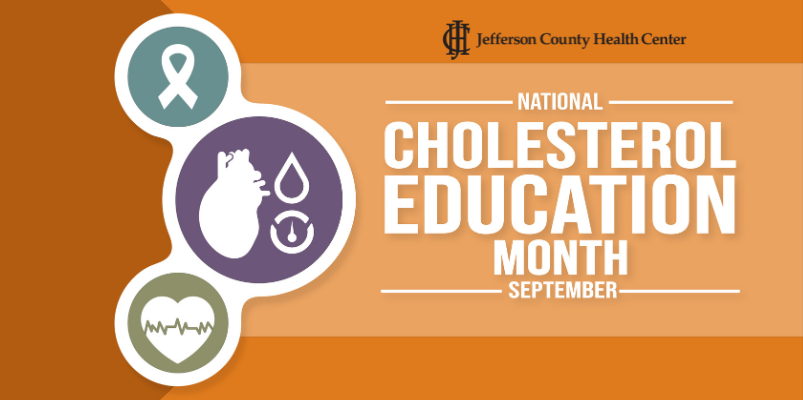National Cholesterol Education Month: How to Lower Cholesterol Levels
September 7, 2023

September is National Cholesterol Education Month, a time to raise awareness about the importance of managing cholesterol levels for heart health. High cholesterol levels can increase the risk of heart disease and stroke. Fortunately, there are several lifestyle changes and medical interventions that can help lower cholesterol levels. Here are some strategies to consider:
Healthy Diet:
-Choose Healthy Fats: Opt for unsaturated fats found in olive oil, avocados, nuts, and fatty fish, such as salmon and trout.
-Limit Saturated and Trans Fats: Reduce consumption of foods high in saturated and trans fats, like fried foods, fatty meats, and commercially baked goods.
-Increase Fiber Intake: Eat more whole grains, fruits, vegetables, and legumes to increase dietary fiber, which can help lower LDL ("bad") cholesterol levels.
Regular Exercise:
-Aim for at least 150 minutes of moderate-intensity aerobic exercise or 75 minutes of vigorous-intensity exercise each week.
-Incorporate both cardio and strength training exercises for overall cardiovascular health.
Maintain a Healthy Weight:
-Losing excess weight can contribute to improved cholesterol levels. Focus on a balanced diet and regular physical activity.
Limit Dietary Cholesterol:
-Reduce intake of foods high in dietary cholesterol, such as organ meats, egg yolks, and high-fat dairy products.
Quit Smoking:
-Smoking damages blood vessels and lowers HDL ("good") cholesterol. Quitting smoking can improve overall cardiovascular health.
Moderate Alcohol Consumption:
-If you drink alcohol, do so in moderation. For men, this means up to two drinks per day, and for women, up to one drink per day.
Medication:
-For some individuals with high cholesterol levels, lifestyle changes alone may not be sufficient. Consult a healthcare professional to discuss medication options like statins if recommended.
Remember, it's essential to consult with a healthcare provider before making significant changes to your diet, exercise routine, or medication regimen. Regular cholesterol checks and discussions with your doctor can help you manage your cholesterol levels effectively and reduce the risk of cardiovascular disease.
References:
- American Heart Association. "Cholesterol." https://www.heart.org/en/health-topics/cholesterol
- National Heart, Lung, and Blood Institute. "High Blood Cholesterol: What You Need to Know." https://www.nhlbi.nih.gov/files/docs/public/heart/wyntk-hbc.pdf
- Mayo Clinic. "Top 5 lifestyle changes to improve your cholesterol." https://www.mayoclinic.org/diseases-conditions/high-blood-cholesterol/in-depth/reduce-cholesterol/art-20045935